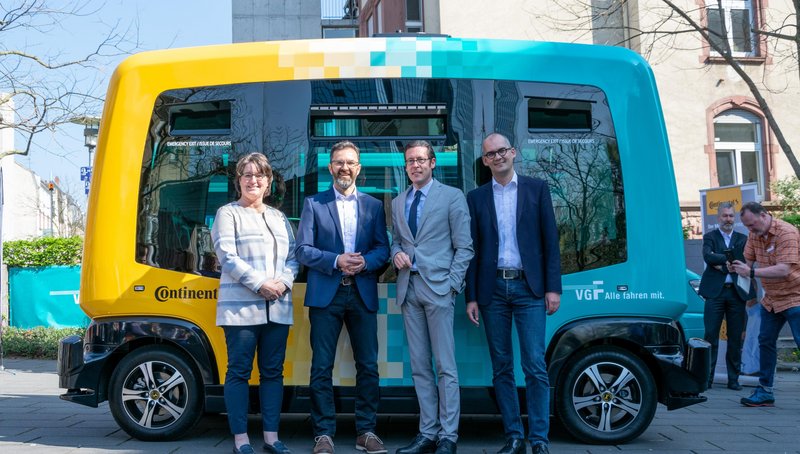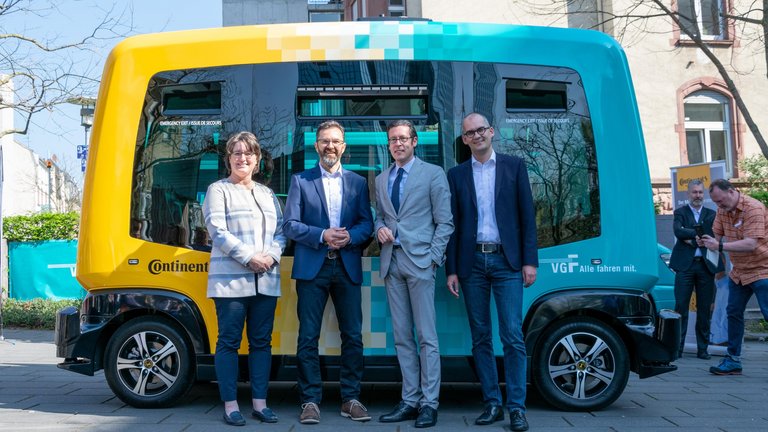Continental and VGF Implement Autonomous Test Operation with Shuttle on Frankfurt University of Applied Sciences Campus
- The purpose of the trial is to share knowhow among Continental, EasyMile and VGF with the aim of determining the future requirements for driverless vehicles and usage models jointly and in a realistic manner.
- From April 17 to April 19, 2018, students at Frankfurt University of Applied Sciences (Frankfurt UAS) will be testing a driverless shuttle service with the Continental CUbE. The shuttle service will drive to the buildings on campus, replacing the existing walking routes.
Frankfurt am Main, Germany, April 17, 2018. Developing, researching and experiencing the future – this is where the technology company Continental, Frankfurt transport authority (Verkehrsgesellschaft Frankfurt am Main, VGF) and Frankfurt University of Applied Sciences (Frankfurt UAS) are working on. To make the future a reality, the partners are launching a three-day, autonomous trial on the Frankfurt UAS campus today. With the driverless CUbE (Continental Urban Mobility Experience) from Continental, students – accompanied by a trained test engineer – can conveniently travel across the campus without having to cover the distance between the buildings on foot. The aim of this trial is to collect practical experience in the operation of driverless vehicles as part of a collaboration between Continental as the technology developer, EasyMile as an intelligent mobility solution integrator and VGF as the potential future operator of such mobility systems. During the trial, the requirements for driverless mobility and usage models are to be investigated jointly and in a realistic manner. The Frankfurt UAS campus provides the ideal conditions for this. What’s special about this project is that students, employees and visitors at Frankfurt UAS can use the CUbE as a shuttle as often as they want during the trial period. Passengers will then be asked to complete a short questionnaire about the journey.
With this partnership and joint trial development opportunities for fully autonomous driving in urban areas are researched. “With this trial, we are making future mobility concepts a reality and at the same time collecting valuable empirical data,” explains Dr. Andree Hohm, head of the Self-Driving Car project at Continental. “We are leveraging our corporate-wide expertise in automation and mobility concepts to develop solutions for the urban traffic of tomorrow and, in particular, to improve the quality of life in urban environments.”
The changing mobility situation in cities is also an important issue facing VGF. General Manager Michael Rüffer commented on the trial: “Some of the technology used in this project – the sensors, for example – are key components of the driver assistance system developed at VGF for our trams, which reduces and prevents accidents. We want to use this technology on a wider scale and have the opportunity to trial it here. It is important,” Rüffer continues, “to integrate autonomous vehicles in our control centre and thus ensure that they are linked to the other systems that we use.” Frankfurt UAS has also noticed the trend toward driverless and electric mobility and is researching this field in its “New Mobility” specialist group. The group’s research area of autonomous driving relates to Frankfurt UAS’s main areas of research: demographic change, renewable energies, mobility and logistics. “The integration of autonomous mobility solutions in the existing infrastructure now needs to be examined so that autonomous driving can offer the option to become an integral part of everyday mobility,” says Professor Dr. Frank E.P. Dievernich.
The Mobility of the Future in Cities Is Autonomous
Increasing urbanisation is one of the reasons why mobility is currently undergoing radical transformation. As part of modern mobility, “robo-taxis” will help to reduce traffic jams, accidents, air pollution and the issue of parking spaces in cities. According to a study by consulting firm Roland Berger, around one quarter of transportation tasks could be carried out by driverless vehicles by 2030.
For large cities that are increasingly being suffocated by today’s form of private transport, robo-taxis offer an effective and efficient way of tackling the challenges of urban mobility. After all, it is much smarter to operate driverless vehicles on a near-continuous basis than to have countless private cars, which often sit in a parking space for 23 hours a day on average. The valuable space that these cars currently take up could, for example, be used for parks and playgrounds in the future. In addition, on closed sites such as campuses, amusement parks and shopping malls, autonomous robo-taxis such as the CUbE could be used to reduce walking distances and to transport people.
To further expand Continental’s global expertise in driverless vehicles, work is being undertaken on local developments for such mobility systems in the U.S.A. and Japan. This means that more Continental CUbE vehicles will also be out and about in these countries in the future. Continental is working hard on the mobility of the future to achieve the long-term goal of Vision Zero – the vision of accident-free driving. To further advance the development of driverless mobility, Continental acquired a minority stake in French company EasyMile SAS in 2017. EasyMile is a leading producer of driverless technologies and intelligent mobility solutions.

